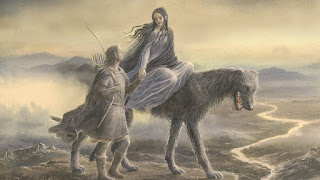Tales for the Times
Very likely you, my minute band of readers, are tired of hearing me talk about J. R. R. Tolkien. I’m going back to him again simply because I consider his writings a prime example of the kind of fiction that we need at this time.
Quite early in The Lord of the Rings, Frodo and his companions are travelling through the wilds with the awareness that fearful enemies are in pursuit of them. As the night falls, and the feeling of isolation and danger increases, Aragorn, their guide, tells them stories to keep their minds from fear. But when one of them asks to hear a particular ancient story, he advises against it, on the grounds that it tells too much of the darkness which their present enemies serve. It might undermine rather than fortify their mental resistance. ‘If we win through to the house of Elrond, you may hear it there, told in full’, he says. Instead, Aragorn tells them the ‘Tale of Tinúviel’, which, though sad, ‘as are all the tales of Middle-earth’, is able to lift up their hearts.
If, for you, the present time holds no particular sense of threat, beyond the need to take all sensible precautions against catching Covid, the rest of this blog post may not seem terribly relevant. But bear with me anyway. I’m writing as one of those who have experienced an increasing sense of imminent danger and darkness over the last six years, in which each downward step has engendered horrified incredulity mingled with a recognition of one’s worst fears being confirmed.
In a time of darkness, when many people’s security is being stripped away, and hearts are fainting with fear, what kind of tale do we need to hear (or to read to ourselves)? Is there a case for pure distraction, light entertainment with a minimum load of serious and weighty issues? Perhaps, in that it gives temporary relief from stress and anxiety. But in the long run, it doesn’t strengthen resolve and build fortitude. Or is there a case for the opposite kind of tale, immersing us in the imagined darkness of the dystopic, the noir, the murder, so as to confront the very worst? In my view, this is what Aragorn advised the hobbits against, when real evil was stalking them in the night. These genres are liable to undermine morale and nullify the will to resist.
This is why, in our house, our annual rereading of The Lord of the Rings has become increasingly valuable. It is itself precisely the kind of tale that Aragorn recommended and recounted in order to keep his companions’ spirits up. Of course, I’m not saying that everyone must read Tolkien, or, for that matter, fantasy, much of which is dark and nihilistic. I think that we need tales that manage to bridge the gap between characters who are ordinary and fallible like ourselves, and deeds of virtuous resolve that inspire us to be similarly staunch and faithful. Tales that remind us that behind the apparent dominion of evil in the present age, there is a more real order of goodness to which we owe allegiance. Tales with a hidden backbone of Christian morality in the deepest sense, that is, in terms of the great virtues rather than of outward profession.*
This kind of fiction is not easy to write. But if you can, you’ll be doing a tremendous service to people whose hearts are troubled by fear of what is coming upon the world, by enabling them to raise their heads and hearts beyond the present tribulation.
Philologus
*Whereas, in my opinion, the films of The Lord of the Rings fall short of all these ideals.

Amen, in spades
ReplyDeleteIt's a worthwhile read. It's a worthwhile cause. Writers, Why not try this writing prompt: write a short piece in which there's an underlying presence of the Christian moral universe, without making direct reference to the God of the Bible and the message of Christ? A presence, not a set of rules of course!
ReplyDeleteThis is very inspiring. I agree that we are in dark times, and I think The Lord of The Rings is a powerful antidote. And I agree with you about the films.
ReplyDeleteI wish I could write like that. You're quite right - life is becoming darker and more fearful and we need to read the right things. That's partly why I steer clear of horror. There's enough of it around without any made-up stuff.
ReplyDeleteThanks for this post. I think this is where poetry comes in aptly. One can write poems to encourage oneself or others just as David did in some of the psalms. It's just as if you read my thoughts, Rebecca, when I wrote an utopian story for my NanoWriMo this November. I created the kind of world and characters I liked to see in the world and I felt better. I see that you have the spirit of discernment! If we can't write the kind of fiction you talk of, then we can pray that the times will get better and the Holy Spirit will dispel all fears of darkness upon our lives and the world now and in the future. Amen.Blessings!
ReplyDelete